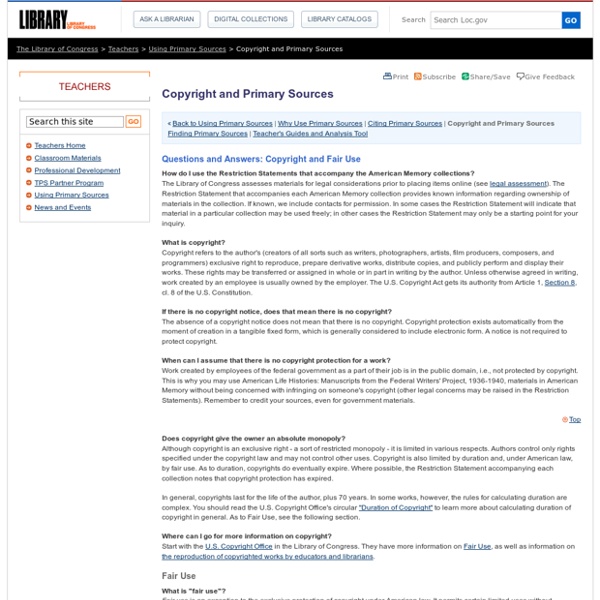The Educator's Guide to Copyright and Fair Use
A five-part series When it comes to copyright law and the application of fair use exceptions, ignorance is definitely not bliss! Learn how to educate yourselves and your students and avoid making a costly mistake! You really did plan to find time over the summer to familiarize yourself with the latest information on copyright law.
The Ultimate Copyright Guide for Students: Basics You Should Know
The Internet has brought the issue of copyright to the forefront like nothing else in history. The ease and speed with which people can share digital information has also made it very easy to commit copyright infringement, intentionally or not. In this guide, we cover copyright, plagarism, and the DMCA with specific references and insights for students. As a student, you have terabytes of data available literally at your fingertips, which makes project research and paper writing easier than they've ever been before. But it also means you must be more aware of copyright rules in order to avoid violating them. Before you can successfully avoid committing copyright infringement, you must first understand what copyright is, and how it works.
Fair Use Scenarios
The principles and limitations [of Fair Use] are designed to guide your reasoning and to help you guide the reasoning of others. "The Code of Best Practices in Fair Use" Center for Media & Social Impact It's long been my contention that you can't "teach" values. The best someone can do is create situations that help people define or refine their own values derived from information, conversation and reflection. To this end, I've always used "scenarios" anytime I work with others on questions of ethics (and online safety).
A Copyright-Friendly Toolkit
However fabulous Creative Commons and Public Domain content may be, sometimes you really need to use copyrighted material. Say you plan to comment on popular media or current events. For instance, you may be planning to critique the portrayal of Native Americans in commercial films. You are going to want to “quote” some commercial films like Pocahontas, Lone Ranger, and Dances with Wolves. If you are reviewing a book, you may want to share its cover art. You may use copyrighted content without asking permission if you believe that your use falls under the doctrine known as Fair Use.
Teaching Copyright
As today's tech-savvy teens become increasingly involved with technology and the Internet for learning, work, civic engagement, and entertainment, it is vital to ensure that they understand their legal rights and responsibilities under copyright law and also how the law affects creativity and innovation. This curriculum is designed to give teachers a comprehensive set of tools to educate students about copyright while incorporating activities that exercise a variety of learning skills. Lesson topics include: the history of copyright law; the relationship between copyright and innovation; fair use and its relationship to remix culture; peer-to-peer file sharing; and the interests of the stakeholders that ultimately affect how copyright is interpreted by copyright owners, consumers, courts, lawmakers, and technology innovators. Unit Goals
From Cop to Counselor
Most of these columns, updated and edited, can be found in my book School Libraries Head for the Edge. Buy it and I might be able to afford a nicer nursing home one day. Thank you. From Cop to Counselor on Copyright
Anti-Plagiarism Strategies
Robert Harris Version Date: May 18, 2015 Earlier versions: December 30, 2013; February 28, 2012; December 18, 2010; June 14, 2009; November 17, 2004 The availability of textual material in electronic format has made plagiarism easier than ever. Copying and pasting of paragraphs or even entire essays now can be performed with just a few mouse clicks. The strategies discussed here can be used to combat what some believe is an increasing amount of plagiarism on research papers and other student writing. By employing these strategies, you can help encourage students to value the assignment and to do their own work. Strategies of Awareness
Copyright Infringement: 5 Myths vs Facts
Embed Code For hosted site: Click the code to copy <div class='visually_embed'><img class='visually_embed_infographic' src=' alt='Copyright Infringement: 5 Myths vs Facts' /><div class='visually_embed_cycle'><span>by </span><a target='_blank' href=' <br/></div><script type='text/javascript' src=' class='visually_embed_script' id='visually_embed_script_88270'></script><p> From <a href=' For wordpress.com:
After 10 Years, Google Books Is Legal
On Friday, a federal circuit court made clear that Google Books is legal. A three-judge panel on the Second Circuit ruled decisively for the software giant against the Authors Guild, a professional group of published writers which had alleged Google’s scanning of library books and displaying of free “snippets” online violated its members’s copyright. To some digital-rights followers, the Google Books case had seemed to drag on forever: The Authors Guild first filed suit 10 years ago.
Free To Use and Share: Resources To Help Teach Kids (and Adults!) About Copyright and Creative Commons
I've gotten a few requests lately for resources on how to teach kids (and adults!) about copyright. I've written before about how I don't think any lesson on copyright can be effective without an emphasis on creative commons and helping students choose licenses for their own work. Still, there are plenty of good resources out there to help start these conversations or that can serve as reminders as you help create a culture of creativity and attribution at your school. And even though there already exists in my mind a resource titled "A Zombie Librarian's Guide to Copyright," as of this moment, that resource is yet to exist anywhere else, so...



